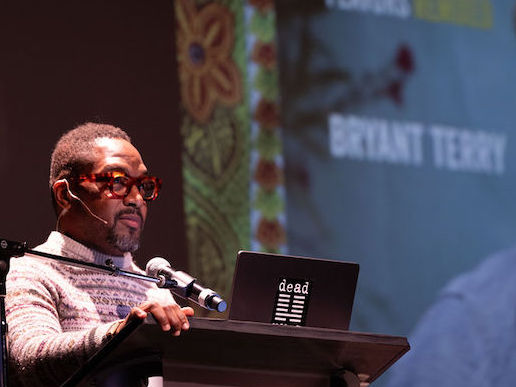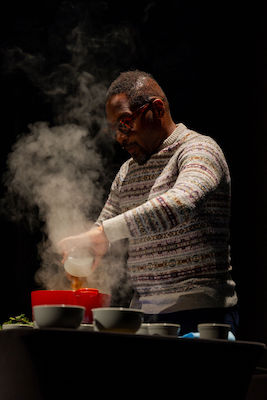Food justice advocate, chef, and author Bryant Terry called on people to seek alternatives to the industrialized food system during his keynote address for UC Santa Cruz’s 40th annual Martin Luther King, Jr. Convocation.
Terry said everyone can do something, whether it’s shopping at farmers markets, growing food or cooking from scratch.
“We all can think of one thing we can do to help contribute to a more healthy and sustainable food system,” he said at the close of the two-hour program on Jan. 31 at the Santa Cruz Civic Auditorium.
His presentation, “Food Justice: At the Intersection of Food, Politics, Poverty, Public Health, and the Environment,” was as multidimensional as the title indicated. Terry also gave a cooking demonstration, sang “Glory, Glory Hallelujah,” played a recording of his mother singing the hymn backed by a jazz beat, and showed photos of his family, cooking influences, and art. In addition to his many other commitments, Terry is an MFA student at UC Berkeley.
The program was the first in-person Martin Luther King Jr. Convocation since 2020, something celebrated by Chancellor Cynthia Larive. While she said she appreciated the virtual events held the last three years, she was grateful to gather with everyone again. “I place great value on being physically together in community with all of you,” she said.
The event, which was live streamed and remains available for viewing for the rest of this month, included performances by Grammy-nominated Santa Cruz singer Tammi Brown and her bandmates as well as the UC Santa Cruz African American Theater Arts Troupe, which presented a scene from Clyde’s, a play opening February 23.
The program commenced with a welcome from Anju Reejhsinghani, Vice Chancellor of Diversity, Equity, and Inclusion and chair of the MLK Convocation committee, a group of campus and community members who spent several months developing the program. The committee developed a survey to collect suggestions for speakers and convocation themes in future years.
Master of Ceremonies David Anthony III, professor emeritus of African History at UC Santa Cruz, asked the audience to reflect on how the annual convocation has lasted longer than King lived (King was assassinated at age 39). He pointed out that Civil Rights activists Medgar Edvers and Malcom X were also in their 30s when they were killed. “When you think about 40 for this anniversary, keep that in mind,” Anthony said.
Terry is a James Beard Award–winning chef and author of several critically acclaimed cookbooks. San Francisco Magazine included Terry among 11 Smartest People in the Bay Area Food Scene, and Fast Company named him one of 9 People Who Are Changing the Future of Food. From 2015 to 2022, Terry served as the inaugural Chef-in-Residence at the Museum of the African Diaspora (MoAD) in San Francisco. In this role, he curated public programming at the intersection of food, farming, health, activism, art, and culture.
Growing up in Memphis, Tenn., where King was assassinated in 1968, Terry said he always felt King’s presence in his life. He credits King’s radical legacy as an inspiration, particularly his unyielding stance against economic injustice and poverty.
Other inspirations that led to Terry’s career in food justice included the Black Panthers’ Free Breakfast for School Children Program in West Oakland in the 1960s and 1970s, Boogie Down Productions’ 1990 anti-meat-eating song “Beef” and Upton Sinclair’s 1906 muckraking novel on the meatpacking industry, The Jungle.
The latter two helped turn him into what he said was “the most judgmental, dogmatic vegan” ever. “I apologize to my parents weekly for that period because I was so annoying,” he said with a laugh.
In retrospect, he said that time of his life taught him an important lesson. “The least effective way of bringing more people to the table is yelling and screaming at them and making them feel bad for where they are in the journey,” he said.
In sharing his journey, Terry discussed his many books, including Afro-Vegan, Vegan Soul Kitchen, Vegetable Kingdom, and the recently released Black Food, published through his 4 Color imprint with Ten Speed Press/Penguin Random House. He also expanded on his artwork, residency at the Museum of the African Diaspora, and experience as a member of the second cohort of UC Berkeley Abolition Democracy Fellows. Terry said he was touched by the warm welcome he received from students, staff, faculty, and community members at UC Santa Cruz and promised to come back.
He wrapped up the program with a cooking demonstration of a dish from Afro-Vegan that included collard greens, Swiss chard, tofu, curry season blends and garlic. “I like to think about recipes as a tool,” he said. “But I think they should be a structure you could play within.” He said cooking should “flow like jazz.”
Terry said he often hears people say they can’t cook because the process is too time consuming and costly but pointed out that the problems can be alleviated if they prep ingredients in advance and work together.
“Capitalism convinces us that every problem - we have to address as an individual,” he said. “We have to get back to more communal ways of cooking and living.”
People should also work together to further the food justice movement, which he said is one of the most important movements this century.
“We need all hands on deck so we can save our earth,” Terry said, encouraging people to counter the narrative that promotes processed food. “Time, talent, treasure - whatever you can give, do it.”




